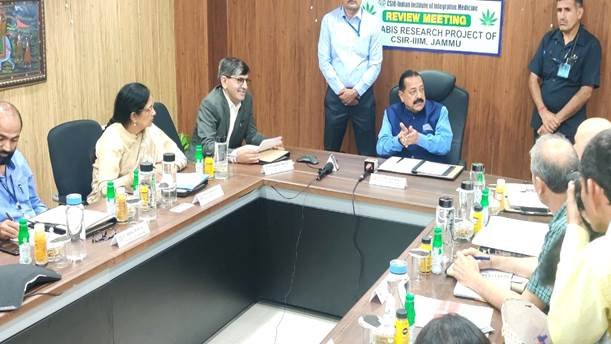India to produce export-quality Cannabis: Dr Jitendra Singh
Dr Jitendra Singh chairs the review meeting of the Cannabis Research Project of CSIR-IIIM at Jammu
‘Cannabis Research Project’ of CSIR-IIIM Jammu is a first of its kind in India which has great potential to produce and export quality medicine for neuropathies, cancer & epilepsy, Dr Jitendra Singh, Union Minister of State (Independent Charge) Science & Technology; said this while chairing a review meeting with the top officials of CSIR-IIIM and J&K UT Science and Technology Department.
During the meeting, Dr Jitendra Singh said, the signing of a scientific agreement between CSIR-IIIM and IndusScan was historic not only for J&K but for the whole of India as it has the potential to produce those kinds of medicines which have to be exported from foreign countries. This kind of project will give an impetus for huge investment in Jammu and Kashmir, Dr Singh added.
While appreciating CSIR-IIIM for this project, Dr Jitendra Singh said, CSIR-IIIM is the oldest scientific research institute in India with a history of discovering the mint way back in the 1960s, the centre of purple revolution and now the Cannabis Research Project of CSIR-IIIM is going to make it more prestigious in terms of scientific research in India.
Dr. Jitendra Singh further said, for such a kind of important project, synergy between institutions like CSIR-IIIM, IIM, IIT, AIIMS etc. is imperative to look for various technicalities involved in it like the marketing strategies that can be done through IIM, clinical trials through AIIMS, technical support through IIT etc. as all these institutions are only situated in a radius of few kilometres in Jammu which is now the hub of education in India.
Dr Jitendra Singh chairs the review meeting


